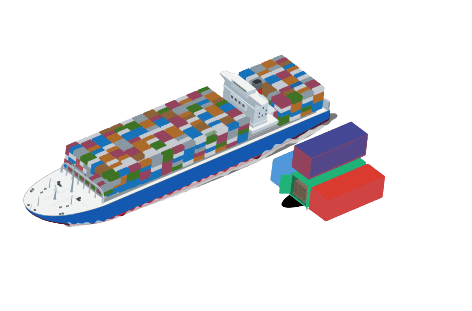International maritime transportation is one of the essential pillars of global logistics and plays a crucial role in international trade. Considered a mode with an excellent cost-benefit ratio, maritime cargo transportation is widely used to move goods over long distances around the world.
What is International Maritime Freight?
International maritime freight is the transportation of goods through vessels designed to navigate the seas, connecting different countries and continents. This mode has been used since antiquity and, over the years, has undergone significant evolutions, especially in terms of increased cargo capacity and operational efficiency.
Types of Maritime Transportation
There are two main types of maritime transportation: coastal shipping and long-haul transportation, also known as international shipping. Coastal shipping is suitable for domestic operations conducted between ports within the same country. On the other hand, international shipping is the most appropriate option for international trade, connecting national ports to international ports in different countries.
Types of Transported Cargo
In maritime transportation, cargoes are classified into two categories: bulk cargo and general cargo. Bulk cargo consists of products that do not require specific packaging and can be solids, liquids, or gases. General cargo is packaged or accommodated in unique volumes, such as vehicles and machinery.
General cargo can be handled in three distinct ways: breakbulk, neo-bulk, and containers. Containers are particularly important as they offer greater security and ease of goods transfer, and they enable the use of different container types, such as dry boxes, ventilated, reefer, and bulk containers, suitable for various types of cargo.
Advantages of International Maritime Freight
International maritime transportation offers several advantages for companies engaged in international trade. Some of the key advantages include:
- Cost-effectiveness: Maritime freight is generally more economical when compared to other transportation modes such as air freight. It allows for the transportation of large volumes of goods in a single operation, resulting in reduced costs per unit.
- Safety: Maritime transportation is considered a secure option for transporting goods, with a low incidence of accidents and theft, especially when closed and sealed containers are used.
- Cargo Capacity: Ships have a large cargo capacity, enabling the transportation of significant volumes of goods in a single voyage, making it an efficient choice for large-scale shipments.
- Global Coverage: Maritime transportation offers extensive global coverage, with most countries having established ports and maritime routes, facilitating connection to virtually any destination worldwide.
- Environmental Sustainability: Compared to other transportation modes, maritime freight is more environmentally sustainable, as fuel consumption per transported ton is lower.
Disadvantages of International Maritime Freight
Despite its advantages, international maritime transportation also has some disadvantages that need to be considered:
- Speed: Maritime transportation is slower compared to other modes like air freight. Depending on the route and distance, delivery can take several weeks or even months.
- Delivery Timeframes: Predictability of delivery timeframes can be affected by factors such as weather conditions, port congestion, and bureaucratic processes.
- Port Limitations: Some ports may have limitations in terms of infrastructure and handling capacity, which can result in delays and inconveniences.
- Packaging Requirements: Maritime transportation may require sturdier and more resistant packaging to protect goods during the journey, representing an additional cost for exporters.
- Port Congestion: During periods of high demand or operational issues, ports may experience congestion that impacts the flow of operations.
Conclusion
International maritime transportation is an essential option for international trade, offering an economical and reliable solution for moving goods over long distances. Its use enables the connection of different countries, facilitating global trade efficiently.
However, it’s essential to consider the specifics of each operation and choose the most suitable mode for the company’s needs. Additionally, relying on experienced and reliable logistics partners is crucial to ensuring the success of international maritime transportation operations.
What is Cheap2Ship?
Introducing Cheap2Ship, a technology company specialized in logistics and international trade. Through our advanced platform for freight management and quoting, medium and large companies have experienced a significant increase in operational efficiency and a reduction in logistics costs.
Our commitment is to provide greater transparency in costs related to current freight providers, such as shipping companies, freight agents, and carriers. With this, our clients can make more informed and strategic decisions for their businesses.
To learn more about our innovative solutions, visit our website and follow us on social media. There, you’ll find relevant content about international trade, logistics, and supply chain. We’re ready to boost your company’s success in the global market. Join us and discover how we can make a difference for your business.

